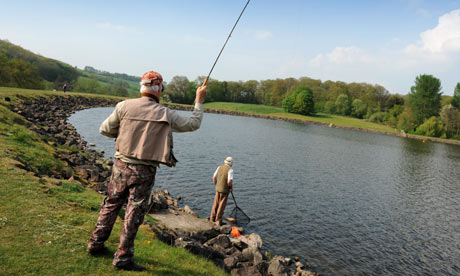Welcome to DU!
The truly grassroots left-of-center political community where regular people, not algorithms, drive the discussions and set the standards.
Join the community:
Create a free account
Support DU (and get rid of ads!):
Become a Star Member
Latest Breaking News
General Discussion
The DU Lounge
All Forums
Issue Forums
Culture Forums
Alliance Forums
Region Forums
Support Forums
Help & Search
Environment & Energy
Related: About this forum£30bn bill to purify water system after toxic impact of contraceptive pill
http://www.guardian.co.uk/environment/2012/jun/02/water-system-toxic-contraceptive-pill
Falls in the fish population have been linked to the main ingredient in contraceptive pills. Photograph: David Bagnall/Alamy
Britain faces a £30bn bill to clean up rivers, streams and drinking water supplies contaminated by synthetic hormones from contraceptive pills. Drastic reductions in these chemicals, which have been linked to collapses in fish populations, are proposed in the latest European Union water framework directive.
But the plan, which would involve upgrading the sewage network and significantly increasing household water bills, is controversial. Water and pharmaceutical companies dispute the science involved and argue the costs are prohibitive. By contrast, many environmental researchers say the proposal is sound. Ethinyl estradiol (EE2), the main active ingredient of contraceptive pills, can trigger a condition known as intersex in freshwater fish, which has caused significant drops in populations in many species – although no links have yet been made with human health. "That does not mean we will not find impacts in future," said toxicologist Professor Richard Owen of Exeter University. "But do we want to wait until we see effects in humans, as we did with thalidomide and BSE, or do we act before harm is done?"
Preventing EE2 from having environmental or health effects is difficult, however. "Ethinyl estradiol is a very potent chemical," said Professor Susan Jobling of Brunel University. "It is designed to have effects in the human body at very low levels. That means it will also have a significant impact in the environment."
More than 2.5 million women take birth control pills in the UK. Their EE2 content is excreted and washed into sewage systems and rivers. Even at very low concentrations, this chemical has harmful effects on fish. Males suffer reduced sperm production, with severe effects on populations. In one recent trial, in a Canadian lake, researchers added EE2 until levels in the water reached five parts per trillion (ppt), a minute concentration. Yet fish populations suffered severe problems with one species, the fathead minnow, collapsing completely.
InfoView thread info, including edit history
TrashPut this thread in your Trash Can (My DU » Trash Can)
BookmarkAdd this thread to your Bookmarks (My DU » Bookmarks)
2 replies, 1357 views
ShareGet links to this post and/or share on social media
AlertAlert this post for a rule violation
PowersThere are no powers you can use on this post
EditCannot edit other people's posts
ReplyReply to this post
EditCannot edit other people's posts
Rec (9)
ReplyReply to this post
2 replies
 = new reply since forum marked as read
Highlight:
NoneDon't highlight anything
5 newestHighlight 5 most recent replies
= new reply since forum marked as read
Highlight:
NoneDon't highlight anything
5 newestHighlight 5 most recent replies
£30bn bill to purify water system after toxic impact of contraceptive pill (Original Post)
xchrom
Jun 2012
OP
OnlinePoker
(5,716 posts)1. Similar issue was happening in Germany in the 90's
When I lived there, in the Rhine Valley, honey wagons would spread human waste on farm fields as fertilizer. Just before I left, there were reports of groundwater contamination of just about every medicine you could imagine being discovered, not just birth control chemicals, but anti-depressants, anti-psychotics, heart medicines, etc. The cause was directly attributed to the human waste.
LiberalEsto
(22,845 posts)2. But at least the rutabagas are no longer depressed
and the cabbages are far less psychotic.
![]()